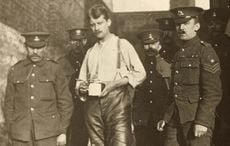The other evening I visited an art gallery opening in Chelsea. There was the civilized clink of champagne glasses and women in high heels that probably cost more than some nations GDP's.
It was an upscale gathering, in other words, catered by a group of lively waiters who hissed at the monied hordes behind their backs.
I had received the invite from a friend and I felt awkward for not enjoying the evening. But the gap between the people attending and the people catering to them was so pronounced. It didn't help that the art works on the walls were stupid, literal, one note, just slogans really. Once you got the joke - and you got it instantly - they were over. I don't know how many were sold the other night. I hope not many.
If art reflects and describes the society and culture in which it's created (and it certainly does) then it's hardly surprising that it's now as balkanized and fractured as the wider nation it reflects.
It's finally possible now to have a long and successful career as an artist without ever really engaging with or contemplating all the centuries that came before us. All those struggles and achievements, straight down the memory hole.
Why, I wondered, is everything in our own era reduced to a simple punchline? Why do we need things spelled out?
Then it struck me: it's because most of us aren't looking forward, or looking back; instead we're just living in an eternal now. It's the age of Facebook updates, Twitter posts, instant polls, real time blogging: happening now, in this moment, not tomorrow, and forget yesterday.
There's a good reason for the relentless focus on the now: I think we're all increasingly fearful of what might be coming.
That's the sort of observation that doesn't get you invited back to parties, I know. Americans prefer optimism. I usually prefer optimism myself. But a journalist should describe what they are seeing, shouldn't they?
The country is in an ever deepening political deadlock; the international economy is in a rolling crisis, the ordinary American worker is being squeezed and squeezed of every last social, medical and legal protection as our Congress openly defies our president on the deficit and jobs bills - meanwhile the super rich in America are watching their portfolios explode in an alternate reality that no longer comports with rest of the nation's.
Some of the super rich are even crying out to pay their fair share, but to lawmakers in the GOP that idea has become blasphemous.
So lately, because of all the collapse and crisis I see around me, I've been thinking a lot about some lines from a W.H. Auden poem:
I sit in one of the dives
On Fifty-second Street
Uncertain and afraid
As the clever hopes expire
Of a low dishonest decade...
Auden was talking about the late 1930's and what they led to, but the poem feels very timely.
We live in an age where networks, radio stations, newspapers, even national broadcasters are now all owned by one man, promoting his politics, globally. For years now we have watched the powerful politicians he has bought and paid for targeting civil rights, education, science, environmental laws, healthcare, unions, Social Security, Medicaid and Medicare - everywhere and all the time - and all to scalp the many to maximize profits for the few.
Whilst working stiffs toil even longer hours for less reward from coast to coast our CEO's have implemented increasingly profitable free trade agreements, they've unfettered the global markets, they've outsourced the nations jobs, they've lowered their own taxes to historically insignificant levels, and they've avoided paying any taxes for their corporations entirely.
It truly is the best time ever to be filthy rich in America.
So our politicians are talking past each other because our social classes are. As above, so below. We live so far apart in terms of opportunity and lifestyle that we no longer know how to talk to each other. Our politicians reflect and enshrine that division.
Currently we're looking at each other across and ever-widening political gulf. What worries some is that eventually, if this continues, we may be looking at each other across barricades.




Comments